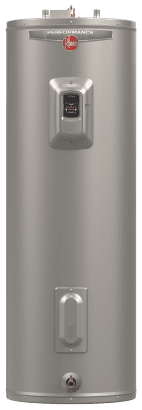Choosing the Right Water Heater
Electric water heaters are a popular option for homeowners seeking an energy-efficient and easy-to-install water heating solution. But what are the pros and cons of electric water heaters? Understanding their advantages and drawbacks will help you determine if an electric water heater is the right choice for your household.

Advantages of Electric Water Heaters
1. Lower Initial Costs
Electric water heaters typically have a lower upfront cost than gas models. Since they don’t require complex ventilation systems, installation is often simpler and more affordable. Learn about the efficiency of different water heaters from Energy.gov.
2. High Energy Efficiency
Electric models convert nearly all the electricity they consume into heat, minimizing energy waste and potentially lowering utility bills.
3. Safety
Unlike gas water heaters, electric units don’t require combustible fuels, eliminating risks associated with gas leaks and carbon monoxide poisoning. According to the U.S. Consumer Product Safety Commission (CPSC), in 2017, heating systems were associated with an estimated 42 deaths due to non-fire CO poisoning, with gas heating systems being a significant contributor.
4. Compact Size and Flexible Installation
Electric water heaters are often smaller and can be installed in a variety of locations without venting requirements, making them ideal for homes with limited space.
Disadvantages of Electric Water Heaters
1. Slower Heating and Recovery Rates
Electric water heaters take longer to heat water than gas models, which can be a drawback for large households with high hot water usage.
2. Susceptibility to Power Outages
Since electric water heaters rely entirely on electricity, they won’t function during power outages, which can be inconvenient in areas with unreliable power.
3. Higher Operating Costs
Electricity rates vary by region, and in some areas, running an electric water heater may be more expensive than using a gas alternative. When choosing a water heater, consider long-term energy costs. “Due to higher electricity rates in many areas, operating an electric water heater can be more expensive over time compared to gas models. On average, homeowners may spend around $42 per month on electricity for a 50-gallon unit, while a similar gas water heater costs about $30 per month to run.” (Bob Vila)
Final Thoughts
Electric water heaters offer affordability, efficiency, and safety, but they may not be the best choice for every household. If you live in an area with high electricity costs or frequent power outages, a gas model might be a better option. However, if you’re looking for a low-maintenance, easy-to-install solution, electric water heaters can be a smart investment.
If you’re considering an upgrade, check out our water heater installation services in Rock, Dane, and Green Counties.

